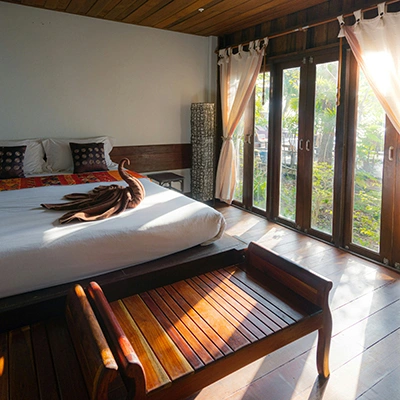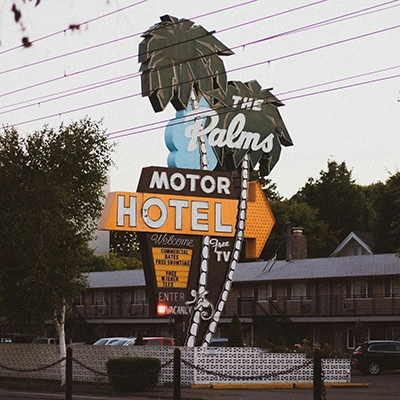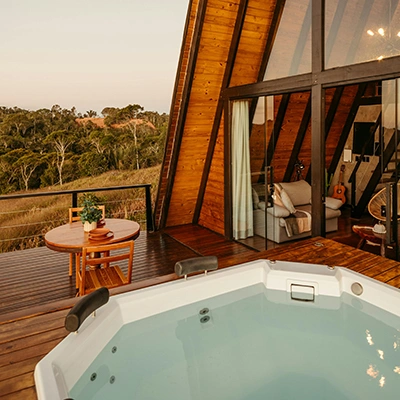More than a billion people travel each year, and no two of them travel exactly the same way. From solo journeys in Patagonia to family adventures up the California coast, every adventure is unique.
Each type of traveler needs a different type of accommodation. With such a variety of options, it can be difficult to know what works best for you on a vacation.
Types of Places to Stay on Vacation
Hotel
Like any type of accommodation on this list, staying in a hotel has its pros and cons. Hotels have the advantage of location, location, location. They tend to be close to the action, making walking or driving to wherever you need to go a breeze.
Also on the pro side, you typically know exactly what you’re getting when you book a hotel: a specific check-in and check-out time, your own room with a private bathroom, tiny shampoos. Knowing what you’re getting yourself into takes a load of stress off your shoulders, especially when you’re traveling with young children.
That being said, there can be more variety between tiers of hotels. One- and two-star accommodations are more basic; don’t expect much beyond the bed and bathroom. Three- and four-star start making their way into more luxurious territory where you can start to expect a continental breakfast, pool, workout room, and other amenities to make your stay more comfortable.
Even with this variation, there’s some expectation of service within each level. As long as you check out reviews and ratings, you should be able to avoid too many surprises.
On the downside of hotels is that their convenience and location sometimes come at a price. The average cost of a hotel in the U.S. is about $170 per night. Expect higher prices in popular destinations like Miami and New York. If you’re a budget-conscious traveler, hotels might not be the best option for you.
Motel
Motels can be ... polarizing. You either think they’re musty and dirty with perpetually dripping bathroom faucets, or you have a nostalgic love for them and how campy they can be. And to be honest, both descriptions can be right.
Motels gained popularity along with car travel in the U.S. during the 1950s, hence the name being a combination of “motor” and “hotel.” That’s why you’ll find them located near highways and why, if you need a quick stop for the night during a road trip, you might give a motel a try.
Motels tend to be less expensive than hotels, making them good for smaller families on a budget. Just be aware that you’ll probably get what you pay for, which is not much. They might serve a basic breakfast, but you won’t find a gym or similar amenities.
The quirkiness of motels is what attracts many road trippers. Many websites tout their lodging as “vintage” or “classic.” Staying in one will feel like you’ve stepped back in time a decade or six. Just be sure to look for recent reviews and photos. What one person might call vintage, someone else sees as old and outdated.
Motels are only found in the U.S., so if you’re hoping to find a cheap accommodation on your European vacation, you’ll need to consider another option.
Timeshares
Timeshares are a kind of vacation ownership program where you pay for a portion of a condo or resort accommodation. Others also pay for a portion, and you all share the right to use that condo on a rotating basis. Depending on the type of timeshare, that rotation could be that you stay at the property the same week every year or for a specified length of time at any point during the year (as long as it’s available). Your share may only come up every other year in some instances.
There’s also some variation in whether you can only stay at your property or if you can choose from any of the properties within a family of resorts. This is how a lot of people find the best place to stay at Disney World — through the Disney Vacation Club timeshare program.
Timeshares aren’t for everyone, but for travelers who like routine or want to visit the same destination every year, they can be super advantageous. When you invest wisely, owning a timeshare can save you money as long as you remember that there’s the upfront cost of purchasing the timeshare as well as annual maintenance and HOA fees. It’ll take some time for your investment to pay off, so plan to make a multi-year or even lifetime commitment.
Like Disney, more hotel and resort chains are entering the timeshare game, too. This is a popular choice for some who like timeshares but want more flexibility to see different places. Rather than being locked into a single property or unit, you can choose from any of the resort’s offerings.
In addition to the Disney Vacation Club, you might look into Marriott Vacation Clubs, Hilton Grand Vacations, or Club Wyndham for some reputable options.
Vacation rental
House sharing can be a bigger gamble than staying at a chain hotel, but with so many options now and growing popularity, the odds are pretty good of finding something that captures your fancy.
Some Airbnb or Vrbo hosts pride themselves on delivering a unique or quirky experience. One-of-a-kind decor, personalized amenities, and local recommendations provide an extra touch of service you might not find at more mainstream lodging.
Seven Corners writer Kelsey Tharp Nighthawk had an Airbnb host in Nashville that gave amazing restaurant recommendations. (If you’re in the area, eat at Five Daughters Bakery. You’re welcome.) At another rental in Michigan, her host baked blueberry scones every morning. Years later, she still dreams of their blueberry goodness.
Vacation rentals have an added benefit of being just about anywhere you want to be. If you’re looking for a downtown, central location, you’ll find it. If you’d rather be on the outskirts of the action where it’s quieter, you’ll find that, too.
We especially like vacation rentals if you’re traveling with a group. You’d be hard-pressed to find enough space for a family reunion or girls’ getaway at a hotel. But rent an entire home and you’ll have room for everyone.
Not everything is perfect with rentals, unfortunately. While it can still be cost effective, especially for groups, the excellent deals of the early 2010s are increasingly rare. Keep an eye on hidden fees, too. Taxes, cleaning fees, and other charges can quickly make a seemingly good deal turn sour.
House sharing can also be unpredictable. Try some of these tips to make sure your vacation rental is what you think it is:
- Read host reviews before committing to anything. Keep an eye out for comments about loud neighbors, dirty or unclean spaces, and parking.
- In early 2024, Airbnb stopped allowing hosts to use indoor cameras at their properties. Cameras were previously permitted in hallways and living rooms. Outdoor security cameras are still allowed as long as they notify you. If this and other security measures are important to you, look for them on the booking website or contact the host directly.
- Notice whether the host lives on-site. Some travelers might not mind sharing a space with their host; they might even prefer it. They host will be nearby if you need something fixed or simply want a dinner recommendation. Other travelers will feel like an on-site host is too much like having someone constantly looking over their shoulder.
- Match your travel style with the amenities. It’ll be tough to find a rental with a gym. If you need to work up a sweat on the road, you might be better off at a hotel. If you like the idea of relaxing nights in with takeout, look for something with a kitchenette and some of the cooking/dining essentials (plates, cups, silverware). On the other hand, travelers simply looking for a place to sleep can probably go with more basic set-up and worry less about appliances and whether or not there’s olive oil in the pantry.
Hostel
Hostels are the ultimate money-saving option. Depending on the location, you may be able to book a room for $20 per night. That's why they’re most commonly used by college-aged people and recent graduates.
There are reasons hostels are so inexpensive. Although some have double rooms — perfect if you have a travel companion — you’ll typically have to share a room with strangers in a bunkbed arrangement. Those other people may have different schedules than you, coming back at 3 a.m., perhaps after a night of partying.
You won’t just be sharing a bedroom, either. Community bathrooms and shower rooms are the norm. We’ve stayed at some that were kept impeccably clean, but even they were always wet. Be sure to pack some flip-flops if you can’t stomach walking on slimy floors.
On the upside, you’ll find hostels in most major cities around the world, and they’re a great place to meet other people, full of solo and adventurous travelers. If sharing a bunk isn’t enough quality time for you, hostels will also have kitchens (added bonus: save money by not eating out every day) and community rooms.
Some will also host mixers and other social activities. Becky Hart stayed at a small hostel in Canterbury, England, one summer where the host organized a simple dinner and pub crawl nearby. She invited everyone individually, treating you more like a guest in her home than a customer.
If you’re planning on this option, visit a reputable site, like Hostelworld, for reviews from those who have stayed previously before booking your room. Here are some of our top things to look for when deciding on a hostel:
- Some hostels have age limits, both minimums and maximums. Make sure you fall within the required range before you show up on the doorstep.
- Because you share sleeping space, security for your belongings is a concern. Find out if the hostel provides lockers. And if they do, ask if they provide a lock or if you need to bring your own
- Some hostels have co-ed rooms. Others separate you by sex. Some solo female travelers prefer the all-women's dorm, while those traveling with a mixed group may need to find a co-ed option.
- Consider memberships. Some chain hostels offer discount or loyalty programs. If you’re on a backpacking trip (AKA traveling on a shoestring budget) where you’ll be staying in several hostels along the way, this can be a good investment.
- Find out if they have a curfew or check-in time cap. Travelers looking to improve their odds of having quiet roommates will hope the answer is yes. But either way, a curfew can put a major damper on your trip if you don’t arrive at your destination until late at night. Don’t let a flight delay or other travel mishap keep you from checking in after hours.
Camping & Glamping
Right on par with hostels in terms of budget is camping. Accommodations are at their most basic. All you get is a patch of land to pitch your tent, after all. Half of you reading this right now are saying, "Absolutely not. I’m not sleeping on the ground, and I need indoor plumbing.” Seven Corners Digital Designer Maddie, whose husband took her camping for the first time for her birthday, is right there with you. "You could hear all these animals, and you didn’t know if it was a bear or a deer or a bird or a raccoon,” she said.
The other half of you can’t think of anything better than being out in nature all night, roughing it, and having an all-natural experience. Camping is a great way to see national parks, too. You’ll be immersed right in the heart of it all and at a fraction of the price of one of staying at one of the lodges.
The thing about camping is that the very thing that one traveler loves is the same thing that another traveler would rather miss — cooking your own meals over a fire, being self-sufficient for all your own needs, bedding down in a sleeping bag. Whether camping is the right choice when you’re looking for the perfect place to stay is largely based on your own perspective.
If parts of camping sound up your alley but roughing it in a tent sounds a bit too rough, consider glamping. Also known as glamorous camping, you’ll reserve a cabin or luxurious tent with an actual bed and access to an indoor bathroom. Meals — cooked by someone else — are likely included or at least available.
To make things even easier, Hilton and AutoCamp signed a partnership that allows glampers to book directly through Hilton booking sites. Now, Hilton Honors members can earn and redeem points on stays with AutoCamp, which provides custom Airstreams and glamping tents, often near U.S. national parks.
You’ll pay more for glamping versus traditional camping, but if that means you’ll enjoy your trip more, the extra expense could very well be worth it.
Unusual accommodations
Sometimes the type of place to stay on vacation is less important than the personality of the place itself. If that’s the case you need an unusual accommodation. Who’s up for a treehouse, geodesic dome, converted train car, or a cave?
Geodesic domes, or bubble hotels, are most appealing in far-north climates. For those who want to see the Northern Lights or stargaze from bed, you can’t do much better than a bubble hotel. For an even more extreme — yet still luxurious — option, try an ice hotel somewhere like Montreal, Canada, or Swedish Lapland.
- Get in over your head at The Manta Resort in Tanzania. You can quite literally sleep under the Indian Ocean in its underwater villa. Catch some sunrays up top, then catch your ZZZs among the fishes.
- If you’re in the U.S., check out these luxury caves in Big Bend, Texas. Wannabe cave dwellers will also find tons of options in Türkiye. We have the region’s geology and a network of ancient houses to thank for that.
- Ecolodges around the world often have unique character. You might be lodging amongst the treetops or in a cabin that makes you feel like you’ve eliminated all barriers between man and Mother Nature.
- book a room in a historic chateau or castle. Many throughout Europe have converted to hotels or Airbnb rentals.
- This train caboose in Hocking Hills, Ohio, looks a bit out of place in the middle of the woods. Inside, though, is a state-of-the-art setup that sleeps five with a surprising amount of comfort and style.
Find a Place to Stay ... and Then Protect It
When you invest in the perfect place to stay on vacation, you want to protect that investment. Travel insurance can help by covering your prepaid, nonrefundable booking if you have to cancel your trip or change your plans for a covered reason.
Where you stay can be just as important as what you do. Why leave it to chance? Enjoy your travels to the fullest by choosing trip protection you can count on. Get a quick quote at SevenCorners.com or talk to one of our licensed agents. They can help you find the right coverage, no matter where you go.
About the Authors
With years of travel to their name and countless hotels, hostels, and tents in their passports, Becky Hart and Kelsey Tharpe Nighthawk have seen it all. They’ve experienced lumpy mattresses in the Midwest and magnificent views from an Amazonian ecolodge so that they can provide you with the best insight for your next getaway.





